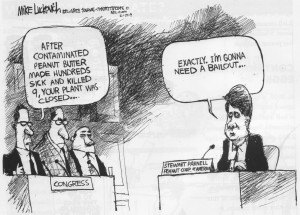What’s up with the Jif peanut butter recall
Really? Another peanut butter Salmonella recall? The last one was a disaster (more than 700 cases of illness and 9 deaths). Among other things, it resulted in imprisonment for the head of the Peanut Corporation of America.
Well, here we go again.
The FDA announced the outbreak traced to Smucker’s Jif.
It also announced Smucker’s recall of those products.
And it provided links to further information.
The CDC announced its investigation results to date.
- Illnesses: 16
- Hospitalizations: 2
- Deaths: 0
- States: 12
- Recall: Yes
- Investigation status: Active
And it issued a food safety alert. Peanut butter has a long shelf life. Discard Jif peanut butter with lot code numbers 1274425 through 2140425, with “425” at the end of the first 7 numbers.
But that’s not all. Companies using Jif peanut butter dip with precut vegetables or in candy were also in trouble (see list at the end).
How does Salmonella get into peanut butter? Scientific American explained how this happened the last time.
Feces from some animal is a strong possibility. A leak in the roof, for example, caused one of the early outbreaks. How salmonella got into the water that was on the roof, no one knows for sure. Maybe birds, for instance, which accumulate around peanut butter processing plants. The roasting of peanuts is the only step that will kill the salmonella. If contamination occurs after the roasting process, the game is over and salmonella is going to survive. Studies have shown that salmonella can survive for many months in peanut butter once it’s present.
Preventive controls, anyone?
And here, thanks to Bill Marler and Food Safety News, is the current list of Jif recalls: .
The collateral damage:
- Rainbow Asset Limited – Hong Kong:May 23, 2022
- Randy Ltd. – Israel:May 23, 2022
- Albertsons Companies(11 store-prepared items) May 21, 2022
- Bix Produce Company(2 products containing Jif Creamy Peanut Butter To Go 1.5 oz. cup) May 26, 2022
- Cargill(multiple products containing peanut butter, sold at the Wilbur Chocolate Retail Store in Lititz, Pa. and online at Wilburbuds.com.) May 23, 2022
- Coblentz Chocolate Company(multiple peanut butter products) May 24, 2022
- Country Fresh(select fresh-cut fruit snack trays and fruit snack cups) May 24, 2022
- Fresh Del Monte(fresh-cut fruit and vegetable products containing ready-to-eat Jif® peanut butter dip) May 24, 2022
- Fudgeamentals(several fudge products made with Jif Peanut Butter) May 25, 2022
- Garden Cut, LLC(Garden Cut products containing 0.750z Jif Peanut Butter Cup) May 24, 2022
- Giant(Store Brand Apples, Pretzels & Celery with Peanut Butter) May 23, 2022
- Martin’s(Store Brand Apples, Pretzels & Celery with Peanut Butter) May 23, 2022
- Mary’s Harvest Fresh Foods Inc(Mary’s Harvest Celery Peanut Butter Cup G&G and Apple Peanut Butter Cup G&G) May 24, 2022
- Price Chopper(M32 Apples, Cheese and Pretzels with Peanut Butter Tray) May 23, 2022
- Taher Inc.(“Fresh Seasons Power Packs”) May 24, 2022
- Wawa(two products containing Jif Peanut Butter) May 24, 2022
- Wegmans(Wegmans Snack with Apple, Pretzels, Cheese and Peanut Butter) May 22, 2022


